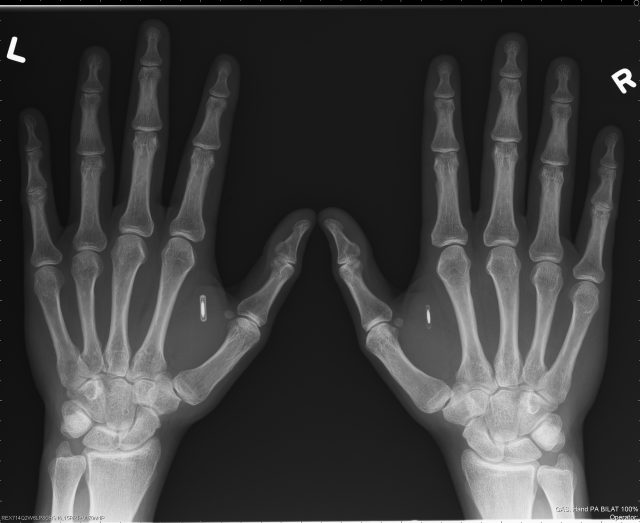
Any serious Bitcoin user will preach the benefits of cold storage: keeping the bulk of your bitcoins offline somewhere, like on an encrypted USB stick, or even printed on a piece of paper. The idea is that by keeping that data offline, it’s far less susceptible to being hacked.
So, the theory goes: what could be safer than keeping it inside your own body?
For the last 10 days, Martijn Wismeijer, a Dutch entrepreneur and Bitcoin enthusiast, has lived with an NFC chip embedded in each hand. One has data that he’s constantly overwriting; he can put his contact details in simply by having another person scan his hand with an NFC-enabled phone. But the other contains the encrypted private key to his wallet.
"I use it for cold storage, but it's not cold because it's 37 degrees Celsius inside my body!" he told Ars over Skype on Friday.
Specifically, he has an "NFC Type 2 compliant NTAG216 RFID chipset" embedded in a tiny glass capsule (2 millimeters by 12 millimeters) that was injected into the fleshy part of his hand between his thumb and index finger. Each capsule can hold just 880 bytes of data, which is more than enough for a cold storage wallet. The Dutchman got it as part of a pre-loaded syringe sold as a $99 kit from DangerousThings.com, a Washington State-based website that sells to hobbyists and biohackers.
On Nov. 3, 2014, Wismeijer had it installed by Tom van Oudenaarden of Piercing Studio Utrecht after his own Amsterdam doctor refused.
"My doctor doesn't like it!" Wismeijer said. "He didn't want to do it, he just wants to make people better, and I’m not sick—I just want this thing inside my body. He was right, so that's why you need body manipulation artists."
“It hurts more than a normal injection”
So how does Wismeijer actually use his hand-based system in practice?
He gave me an example: as the CEO of Mr. Bitcoin, an Amsterdam-based firm that sets up Bitcoin ATMs in the Netherlands and Belgium, he frequently needs to stock bitcoins on those machines.
"We minimize our risk by storing most of them in cold storage and only when we see a lot of happening, do we transfer [to a hot wallet]," he said.
Using Shamir’s Shared Secret—a cryptographic technique to split a secret amongst different people—Wismeijer and his colleagues have to provide a certain number of their private keys to unlock the company’s master cold storage wallet. They can either scan the NFC tags with a USB dongle, or from an NFC-enabled phone.
"To transfer funds to our network, we have to scan our tags, including my hand, which provides part of an encrypted private key, and then only then the phone will transfer to the hot wallet," he said.
"If you had a will, and everyone would have a will, you could create a shared secret and you could use that to execute the will. You can't find such a solution, there's no notary involved, it will revolutionize asset management."
Of course, this isn’t the first time that people have installed NFC, or their predecessors (RFID) tags inside their own bodies. Back in 2004, a nightclub in Barcelona offered to implant RFID tags into the shoulders of a select group of customers so they could use it as a digital wallet rather than carry cash or credit cards. (Clearly, it hasn’t been met with widespread adoption.)
Unlocking a door
Eventually, Wismeijer would like to replace his home door locks with NFC tags so that he can open his front door with just his hand.
That's what Amal Graafstra, the founder of DangerousThings.com has been doing for nearly a decade. He too has the NFC chips installed in the webbing of his hands, and has $200 Samsung Ezon door locks on his house.
"Since 2005 that's what I've primarily been using it for, and I've been really happy," he told Ars. "It unlocks when I reach for the doorknob, and I go in a little high, and it opens."
He doesn't even notice that the chip is there anymore: "You don't even think about it—that's the whole point of implantable technology."
Graafstra said that the company has sold around 10,000 different types of implants since founding the company and is currently working with Wismeijer to further adapt the Bitcoin use case.
And was getting the NFC chips injected painful for Wismeijer?
"It hurts more than a normal injection, it's like a drip line in a hospital—it looks painful but it's not that painful," he said, adding that it doesn’t feel any different when he scans his hand.
"It doesn’t heat up," he said. "But that doesn’t mean it’s fully unnoticeable just yet."
Graafstra noted that usually it takes people a couple of months to fully ignore it and incorporate it into their daily routine.
"You notice it because it's not yet encapsulated—the hole is gone, and that's healed so there's no chance that it will infect," Wismeijer added.
reader comments
129